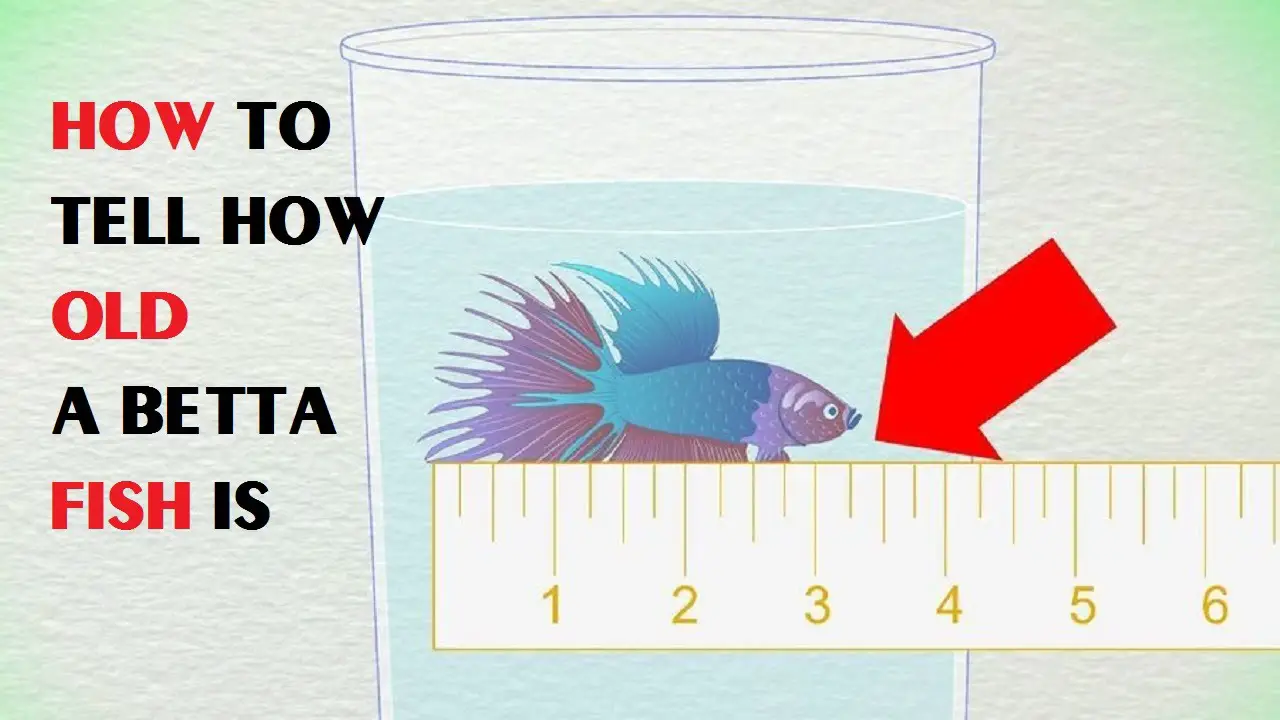Betta fish are one of the most popular and beloved fish in the aquarium hobby. They are known for their vibrant colors, long fins, and unique personalities. As a betta fish owner, it’s important to know how to properly care for your fish, including knowing their age.
Determining the age of a betta fish can be a bit challenging, but there are a few key factors to look for. In this article, we will explore the various methods of determining the age of a betta fish, including examining their physical characteristics and observing their behavior. With this knowledge, you’ll be able to better understand your betta and provide them with the best care possible.
Unlike other animals, it is quite difficult to determine the age of a Betta fish. However, there are some signs that can help you estimate their age. First, check their size. Bettas grow about one inch per month for the first six months. Secondly, look at their fins. Older Betta fish have longer and more elaborate fins. Lastly, examine the color of their scales. Older Bettas tend to lose their vibrant colors and develop a more muted appearance.

How to Tell the Age of a Betta Fish?
Betta fish, also known as Siamese fighting fish, are popular aquarium pets known for their vibrant colors and aggressive behavior. If you’re a betta fish owner, you may be curious about how old your fish is. While it’s not possible to determine the exact age of a betta fish, there are some signs that can give you an idea of its age. In this article, we’ll explore the different ways to tell the age of a betta fish.
1. Size
The size of a betta fish can give you an idea of its age. Betta fish grow at a relatively consistent rate, so a larger fish is usually older than a smaller fish. Adult betta fish can grow up to 3 inches in length, while juvenile betta fish are typically around 1 inch in length. If your betta fish is significantly larger than 3 inches, it’s likely that it’s older than average.
In addition to size, you can also look at the shape of your betta fish to determine its age. As betta fish age, they tend to develop a more rounded body shape, as well as a slightly curved spine.
2. Color
Betta fish are known for their bright and vibrant colors, but the intensity of their color can change as they age. Young betta fish tend to have more intense colors, while older betta fish may have a more faded appearance. This is because the pigment cells in a betta fish’s skin can break down over time.
However, it’s important to note that changes in color can also be a sign of illness or stress, so it’s important to monitor your betta fish’s behavior and overall health.
3. Fins
Another way to tell the age of a betta fish is by looking at its fins. Juvenile betta fish have shorter fins that are less developed than those of adult betta fish. As betta fish age, their fins grow longer and become more elaborate, with males developing longer fins than females.
In addition to length, you can also look at the condition of your betta fish’s fins. Older betta fish may have frayed or damaged fins due to wear and tear over time.
4. Activity Level
The activity level of your betta fish can also give you an idea of its age. Young betta fish are typically more active and energetic than older betta fish, who may move more slowly and spend more time resting.
However, changes in activity level can also be a sign of illness or stress, so it’s important to monitor your betta fish’s behavior and overall health.
5. Breeding Behavior
Betta fish reach sexual maturity at around 6 months of age, so if your betta fish is displaying breeding behavior, it’s likely that it’s at least 6 months old. Breeding behavior includes building bubble nests, flaring their fins, and displaying courtship behavior.
However, it’s important to note that not all betta fish will display breeding behavior, and some may display breeding behavior at a younger or older age.
6. Lifespan
Betta fish have a relatively short lifespan, typically living for 2-3 years in captivity. If you’ve had your betta fish for a long time and it’s still alive, it’s likely that it’s at least 2 years old.
However, it’s important to note that the lifespan of a betta fish can be affected by factors such as water quality, diet, and stress.
7. Teeth
Betta fish have teeth, which can be visible if you look closely. As betta fish age, their teeth can become more prominent and visible.
However, it’s important to note that not all betta fish will have visible teeth, and changes in tooth visibility can also be a sign of illness or stress.
8. Eye Color
The color of your betta fish’s eyes can also give you an idea of its age. Young betta fish typically have dark eyes, while older betta fish may have lighter or cloudy eyes.
However, changes in eye color can also be a sign of illness or stress, so it’s important to monitor your betta fish’s behavior and overall health.
9. Scales
The scales on your betta fish can also give you an idea of its age. As betta fish age, their scales may become more raised or pitted, giving them a rougher texture.
However, changes in scale texture can also be a sign of illness or stress, so it’s important to monitor your betta fish’s behavior and overall health.
10. Life Stage
Finally, the life stage of your betta fish can give you an idea of its age. Betta fish go through several life stages, including fry, juvenile, and adult. If your betta fish is a fry or juvenile, it’s likely that it’s younger than an adult betta fish.
In addition to age, the life stage of your betta fish can also affect its behavior and care requirements, so it’s important to research the specific needs of your betta fish based on its life stage.
In conclusion, while it’s not possible to determine the exact age of a betta fish, there are several signs that can give you an idea of its age, including size, color, fins, activity level, breeding behavior, lifespan, teeth, eye color, scales, and life stage. By paying attention to these signs, you can better understand and care for your betta fish.
Frequently Asked Questions
Here are some common questions related to determining the age of a Betta fish:
1. How can I tell the age of my Betta fish?
One way to determine the age of your Betta fish is to look at its size. Generally, the older the fish, the larger it will be. You can also look at the color of its fins and body. As Betta fish age, their colors may fade and their fins may become frayed or ragged.
Another way to tell the age of your Betta fish is to look at its behavior. Older Betta fish may become less active and swim more slowly than younger fish. They may also become more aggressive and territorial.
2. Can you estimate the age of a Betta fish?
Yes, it is possible to estimate the age of a Betta fish. One way to do this is to look at the size of the fish. A Betta fish that is one inch long is typically less than six months old, while a fish that is two inches long may be closer to a year old. You can also look at the condition of the fins and body to estimate the age of the fish.
However, keep in mind that these are just estimates and not exact measurements of the fish’s age. The best way to determine the age of a Betta fish is to know its birthdate or purchase date.
3. Do Betta fish have a lifespan?
Yes, Betta fish have a lifespan like any other living creature. In the wild, Betta fish typically live for two to three years. However, in captivity, they can live for up to five years or more if they are well cared for.
The lifespan of a Betta fish can be affected by its environment, diet, and overall health. Providing a healthy and clean aquatic environment, feeding a balanced diet, and monitoring the fish’s health can help to increase its lifespan.
4. Can Betta fish live for more than five years?
Yes, Betta fish can live for more than five years if they are given proper care and attention. Providing a healthy and clean aquatic environment, feeding a balanced diet, and monitoring the fish’s health are all important factors in increasing their lifespan.
However, keep in mind that each Betta fish is unique and may have a different lifespan. Genetics, health issues, and other factors can also play a role in the fish’s lifespan.
5. Can you tell the age of a Betta fish by its fins?
Yes, you may be able to tell the age of a Betta fish by looking at its fins. As Betta fish age, their fins may become frayed or ragged. The fins may also lose their vibrant color and become duller in appearance.
However, keep in mind that fin damage can also be caused by other factors such as poor water quality, aggressive tank mates, or physical injury. Therefore, it is important to consider all factors when trying to determine the age of a Betta fish.

How to Tell the Age of a Betta Fish?
In conclusion, determining the age of a Betta fish may seem like a daunting task, but with a little knowledge and observation, it can be done. By examining the physical characteristics of your Betta, such as the size and coloration of their fins, as well as their behavior patterns, you can make an educated guess about their age.
Remember, Betta fish typically live for 2-4 years, but with proper care and attention, they can live even longer. Regular water changes, a balanced diet, and a clean living environment can all contribute to the health and longevity of your Betta.
So, whether you’re a seasoned Betta owner or just starting out, take the time to get to know your fish and their unique personality. With a little patience and care, you can enjoy the company of your Betta for years to come.
